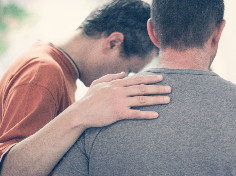
When I Am Weak, Then I Am Strong
Matt Kitchener (MDiv '08) serves as Pastor of Preaching and Pastoral Care at West Point Grey Baptist Church in Vancouver. He enjoys coffee and conversation and is currently in training for his third marathon. Matt would be happy to communicate further about mental health (or anything else) over a cup of coffee and can be reached at [email protected].
A Pastor's Struggle with Depression
Every day, I take two anti-depressant pills. Every week, I am “in the pulpit.” Every three months, I see my psychiatrist. This has been my routine for the last five years, since I was forced to acknowledge to my congregation that I was experiencing “Major Depressive Disorder” and didn’t know if I could keep serving our church as a pastor.
I was two years out of Regent College, serving as Senior Pastor of a multi-staff church. Although I appeared to be handling the normal ministry pressures well, I was dogged by messages of failure and self-loathing. Leadership responsibilities began to feel overwhelming; then it was social interactions; and soon I dreaded just getting out of bed. God felt distant (if there at all), I dreamed of ways to escape my calling, and prayed for God to take my life. I hid my deepening struggle from all but my family and a counsellor.
When I finally tried to act on my suicidal thoughts, I knew I had to make some changes. With the help of my counsellor and my wife, I sat down with two mature Christians who were in church leadership. I told them I was unable to carry on at the church.
I couldn't have imagined them handling the news better. Without any promise I would ever return, they offered me a salaried four-month leave of absence. Together, we carefully crafted a letter to the congregation that I read at the close of the following Sunday’s service. I told the church that I was suffering from depression and I loved them, but that I needed to step away for an undetermined length of time. After reading the letter, I simply walked out. As soon as I left, one of those leaders stepped to the front, reassured the congregation, and expressed faith that God was able to take care of both me and our congregation. He asked the congregation to give me the space I had requested.
The church honoured my request for space while still showing care by leaving meals on my front doorstep. My children continued to go to youth group, where they were cared for but not asked about their dad. I was only asked to check in with our board chair once a month to give an update.
Those four months tasked with “self-care” were at times terrifying, boring, and profoundly life-changing—particularly in my life of faith. I grew up in the home of a pastor and overseas missionary. I can’t remember a time I didn’t believe in God. I went directly from high school to Bible College and was preaching weekly by age twenty-one. But in the months surrounding my crash, I questioned everything I knew about God. I had stopped reading the Bible and praying, as both practices seemed dead to me.
healing practices
Over those months, God used four practices to invite me to faith in the midst of depression:
Silence. Although God seemed absent or nonexistent, my spiritual director convinced me to sit in silence every day, so if God did want to share something with me, I would be present. I would pray a very simple prayer and basically say, Abba, I’m here.
Small and savoured bites of Scripture. After years of reading large chunks of the Bible annually, studying and exegeting for the sake of writing sermons and papers, I now just sat with one or two verses—sometimes for weeks at a time. Selections from Isaiah 40-43 started to come alive to me.
In the silence and meditation, God “met me” twice during those months in a profound, mystical way that I had never experienced before. God communicated a deep love for me even though I was achieving nothing—not excelling in grades, church building, or sermon writing. I met God as “Abba,” apart from my performance.
Community. In addition to God being “mystically” present with me, I received profound grace in a varied human community: a Muslim walk-in doctor who told me her schedule at three different clinics so I could have consistent care; an agnostic psychiatrist who cared for me in his already overbooked schedule; two dear pastor friends who knew my faith struggles and assured me of their love, whether I continued in the faith or not. My wife loved me and parented our two children beautifully when I could not. A local church let us slip in and out without asking too many questions.
Arts and green spaces. I finally began to meet God in my body, not just in my brain. While I can’t paint or draw, I learned to carve crosses from driftwood and found great joy in making collages and representing the symbols of the Christian faith through multiple mediums. I began to walk slowly through forests and run long distances by the ocean.
After three-and-a-half months, I was reflecting and journaling and sensed the invitation from God that I could go back to the church where I had been. Abba’s love was not dependent on my career success. I began to get a sense of excitement about going back, but in a different way.
At the end of my leave, the leaders of our congregation and I rewrote my job description to align better with who I now understood myself to be, including a different capacity for stress in leadership. I would no longer serve as the “Senior” pastor, nor work full-time hours. The board changed its own job description and added a new staff position to accommodate these changes.
Five years removed from the intensity, I reflect on the time away with gratitude. After coming back from my leave of absence, I didn’t know how much I would be able to do or how I would be received. I discovered that far from questioning my fitness to minister, my church family continued to love us and felt a new freedom to be broken and “human” with me and with each other. Some have reported a deeper sense of grace and authenticity in my preaching.
lessons learned
There are a number of lessons I learned (and am learning) from my experience.
I waited too long to ask for help. If I had been more honest earlier in the process, I could have gotten some of the same help without inflicting as much damage on myself and the people I love most: my wife and children.
I am free to be broken and present. I would not have said this prior to my experience with depression, but I had been living as though my brilliant exegesis, well-performed sermons, sage advice, and competent leadership would build up our church and make me significant. I am realizing that those things may impress people from afar, but pastoral ministry is about presence. I had been keeping my distance to maintain those appearances.
I need a community with which I can be weak. My kind and wise counsellor helped me build a “team Matt.” These people helped me when I couldn’t return the favour.
Mental illness continues to be difficult to manage. While most of my story is written in the past tense, the reality is that I still live with both anxiety and depression at least weekly. My depression has genetic, spiritual, mental, emotional, and occupational facets. While I have found a set of spiritual practices, job expectations, and medications that keep me mostly “stable” most of the time, there continue to be setbacks and struggles. I’m still learning where I need to grow and to accept the more permanent limits. I’m still learning what Paul meant when he wrote, “When I am weak, then I am strong” (2 Cor. 12:10).


